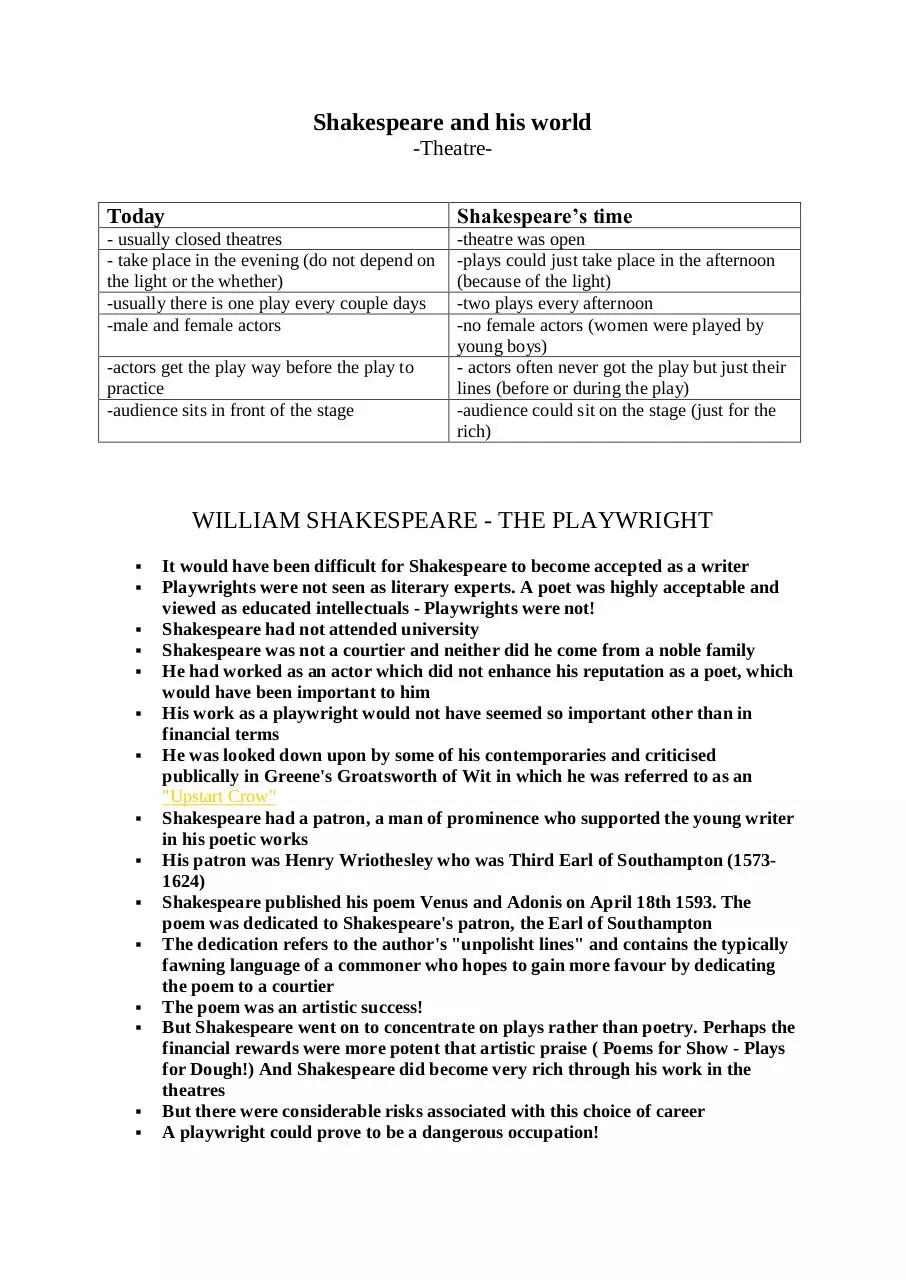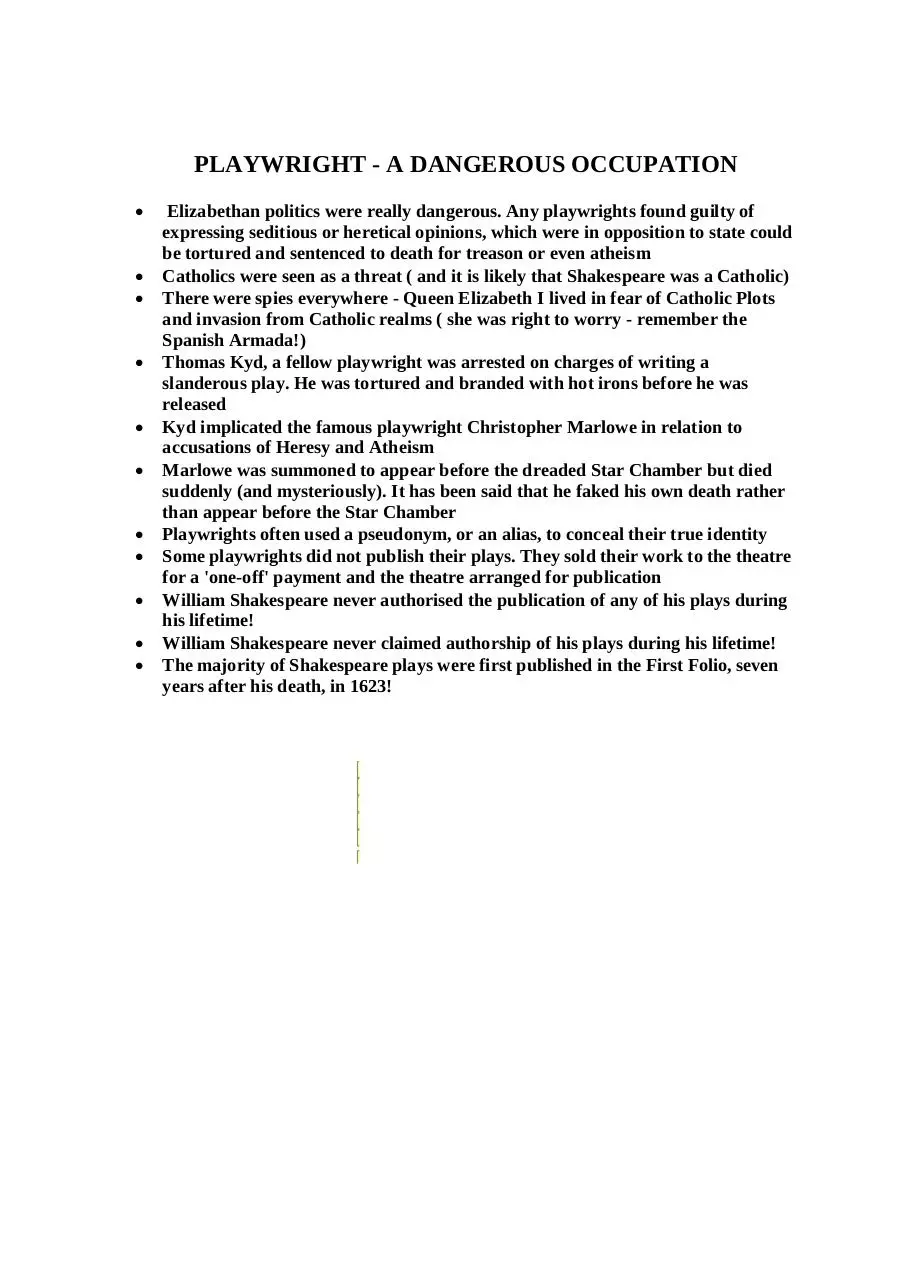Steffen Klenner and others, WILLIAM SHAKESPEARE His theatre (PDF)
File information
Title: Shakespeare and his world
Author: BGV
This PDF 1.5 document has been generated by Microsoft® Office Word 2007, and has been sent on pdf-archive.com on 30/11/2011 at 18:05, from IP address 87.166.x.x.
The current document download page has been viewed 1358 times.
File size: 90.47 KB (2 pages).
Privacy: public file


File preview
Shakespeare and his world
-TheatreToday
Shakespeare’s time
- usually closed theatres
- take place in the evening (do not depend on
the light or the whether)
-usually there is one play every couple days
-male and female actors
-theatre was open
-plays could just take place in the afternoon
(because of the light)
-two plays every afternoon
-no female actors (women were played by
young boys)
- actors often never got the play but just their
lines (before or during the play)
-audience could sit on the stage (just for the
rich)
-actors get the play way before the play to
practice
-audience sits in front of the stage
WILLIAM SHAKESPEARE - THE PLAYWRIGHT
It would have been difficult for Shakespeare to become accepted as a writer
Playwrights were not seen as literary experts. A poet was highly acceptable and
viewed as educated intellectuals - Playwrights were not!
Shakespeare had not attended university
Shakespeare was not a courtier and neither did he come from a noble family
He had worked as an actor which did not enhance his reputation as a poet, which
would have been important to him
His work as a playwright would not have seemed so important other than in
financial terms
He was looked down upon by some of his contemporaries and criticised
publically in Greene's Groatsworth of Wit in which he was referred to as an
"Upstart Crow"
Shakespeare had a patron, a man of prominence who supported the young writer
in his poetic works
His patron was Henry Wriothesley who was Third Earl of Southampton (15731624)
Shakespeare published his poem Venus and Adonis on April 18th 1593. The
poem was dedicated to Shakespeare's patron, the Earl of Southampton
The dedication refers to the author's "unpolisht lines" and contains the typically
fawning language of a commoner who hopes to gain more favour by dedicating
the poem to a courtier
The poem was an artistic success!
But Shakespeare went on to concentrate on plays rather than poetry. Perhaps the
financial rewards were more potent that artistic praise ( Poems for Show - Plays
for Dough!) And Shakespeare did become very rich through his work in the
theatres
But there were considerable risks associated with this choice of career
A playwright could prove to be a dangerous occupation!
PLAYWRIGHT - A DANGEROUS OCCUPATION
Elizabethan politics were really dangerous. Any playwrights found guilty of
expressing seditious or heretical opinions, which were in opposition to state could
be tortured and sentenced to death for treason or even atheism
Catholics were seen as a threat ( and it is likely that Shakespeare was a Catholic)
There were spies everywhere - Queen Elizabeth I lived in fear of Catholic Plots
and invasion from Catholic realms ( she was right to worry - remember the
Spanish Armada!)
Thomas Kyd, a fellow playwright was arrested on charges of writing a
slanderous play. He was tortured and branded with hot irons before he was
released
Kyd implicated the famous playwright Christopher Marlowe in relation to
accusations of Heresy and Atheism
Marlowe was summoned to appear before the dreaded Star Chamber but died
suddenly (and mysteriously). It has been said that he faked his own death rather
than appear before the Star Chamber
Playwrights often used a pseudonym, or an alias, to conceal their true identity
Some playwrights did not publish their plays. They sold their work to the theatre
for a 'one-off' payment and the theatre arranged for publication
William Shakespeare never authorised the publication of any of his plays during
his lifetime!
William Shakespeare never claimed authorship of his plays during his lifetime!
The majority of Shakespeare plays were first published in the First Folio, seven
years after his death, in 1623!
Download Steffen Klenner and others, WILLIAM SHAKESPEARE - His theatre
Steffen Klenner and others, WILLIAM SHAKESPEARE - His theatre.pdf (PDF, 90.47 KB)
Download PDF
Share this file on social networks
Link to this page
Permanent link
Use the permanent link to the download page to share your document on Facebook, Twitter, LinkedIn, or directly with a contact by e-Mail, Messenger, Whatsapp, Line..
Short link
Use the short link to share your document on Twitter or by text message (SMS)
HTML Code
Copy the following HTML code to share your document on a Website or Blog
QR Code to this page

This file has been shared publicly by a user of PDF Archive.
Document ID: 0000035439.